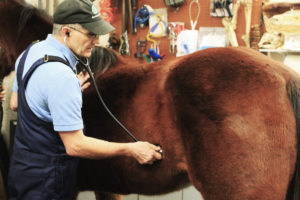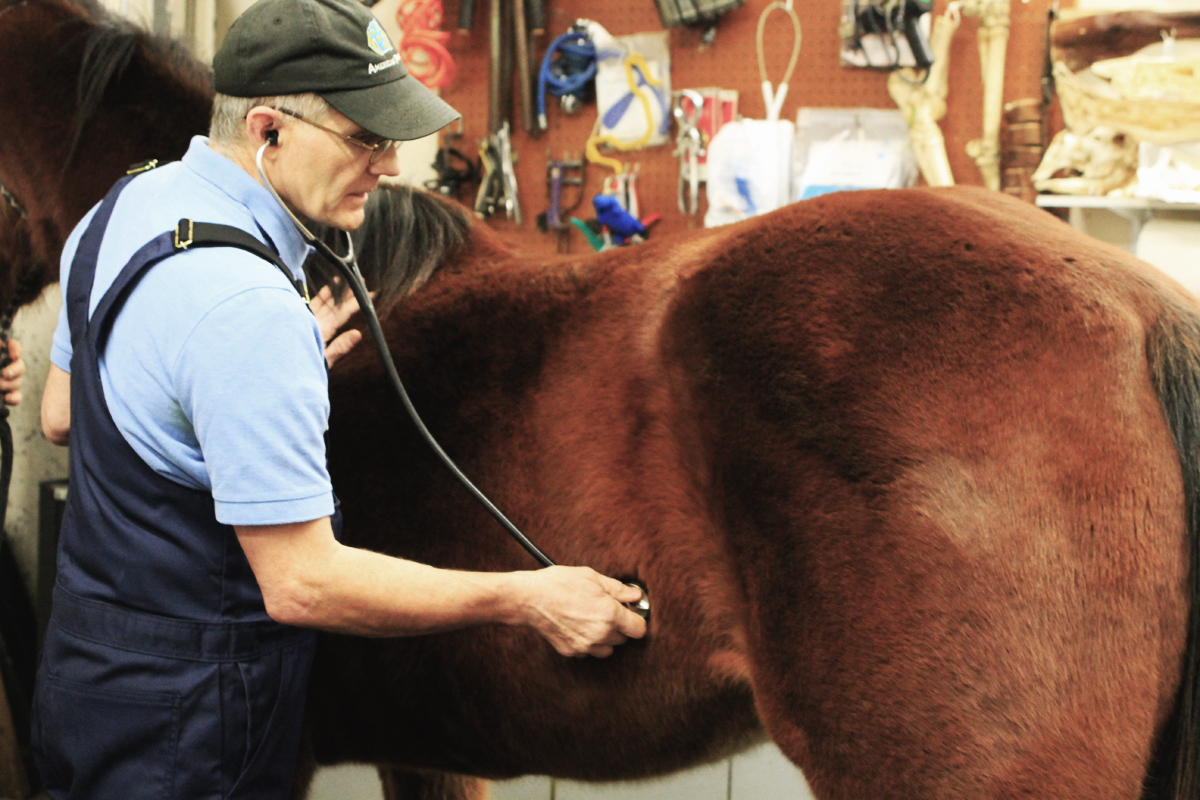Annual Veterinary Visit Can Improve Overall Health
by David Sauter, DVM
 An annual wellness examination by your veterinarian is a great way to assess your horse’s overall health. The purpose of the wellness examination in a horse is similar to that of a human wellness exam. The focus is on improving overall health, preventing health problems, checking in on existing problems, and detecting previously unrecognized health problems. It’s also a great time to get questions answered that you’ve been waiting to ask your veterinarian.
An annual wellness examination by your veterinarian is a great way to assess your horse’s overall health. The purpose of the wellness examination in a horse is similar to that of a human wellness exam. The focus is on improving overall health, preventing health problems, checking in on existing problems, and detecting previously unrecognized health problems. It’s also a great time to get questions answered that you’ve been waiting to ask your veterinarian.
To start the exam a thorough history will be collected. If your horse has had a wellness exam before, this history will simply need to be updated with any new developments over the past year. If this is the first wellness exam, it can take more time to collect all of the information. Being prepared with specific information and dates is very helpful. Here’s a list of some of the information you will need to supply:
- Horse’s training and current use
- Feed – type of hay, grain, and other feeds including amounts (preferably in pounds) and number of hours on pasture
- List of all supplements
- Vaccinations – include specific product names and dates
- List of vices, such as cribbing, wood chewing, stall weaving, food aggression, separation anxiety, etc.
- Date of last dental work
- List of lab tests and dates, such as fecal exams and blood work
- List of previous medical problems and surgeries
After completing the history, your veterinarian will perform a thorough physical examination. Your horse’s temperature, heart rate, respiratory rate, and weight (usually an estimate using a weight tape) will be checked. A body condition score (BCS) will be assigned. This is a numerical scale used to evaluate the amount of fat on a horse’s body. The BCS helps determine if and how much weight a horse should gain or lose.
The heart, lungs and digestive system will be closely listened to with a stethoscope. The heart will be checked for any abnormal rhythm to the heart beat and for abnormal sounds, or murmurs. Lungs will be listened to for signs of congestion, inflammation, infection and heaves. The digestive tract will be checked for abnormal sounds such as sand.
Skin will be checked from one end of the horse to the other, checking for scars, lumps, bumps, tumors, inflammation, allergy, etc. The ears are difficult to examine closely on an unsedated horse but a cursory exam will be adequate to check for abnormalities such as aural plaques and sarcoids.
Eyes will be checked with an ophthalmoscope looking for signs of moon blindness, corneal opacities, cataracts, sarcoids, cancer (such as squamous cell carcinoma and melanoma) and other abnormalities. A darker environment is better for the eye exams; more can be seen with the light of the ophthalmoscope and the horse’s eyes will dilate more allowing more of the interior eye structures to be seen.
Lymph nodes and the thyroid glands under the jaw and in the throat area will be palpated. Mucous membranes will be checked for color (e.g. normal pink, pale, and jaundice), moistness and capillary refill time. A cursory oral exam can be done to assess the teeth and the rest of the oral cavity, if the horse is cooperative. Tendons, ligaments and the joints of the lower legs will be palpated. The feet will be checked and we’ll want to see the horse in motion also, generally at a walk and trot.
Finally, laboratory tests can be an integral part of a wellness exam. In a healthy patient, the laboratory results provide a normal baseline, which can be used for comparison in the future. Sometimes, lab tests reveal problems that would not otherwise be undetected. Here are examples of routine lab tests:
- Complete Blood Count or CBC – checks the cells of the blood, red blood cells, white blood cells and platelets
- Fibrinogen – a blood protein that, when elevated, is an indicator of inflammation
- Chemistry panel – includes a battery of tests to evaluate organ function, electrolyte levels and blood protein levels
- Insulin and blood glucose testing for equine metabolic syndrome
- ACTH testing for Cushing’s disease
- Fecal flotation – egg counts of internal parasites provides valuable guidance on when and what to deworm with
After the history has been collected, the examination performed, and the laboratory tests evaluated, suggestions regarding routine preventative health care practices such as vaccinations, deworming, dentistry, nutrition, and hoof care can be made that are individualized to your horse’s needs. Issues such as weight management, pain management, and specific medical problems can also be addressed.
Wellness exams give us an opportunity to check in on the individual horse’s health and management. The goal is to promote wellness and prevent, as well as manage, disease and health problems. This leads to longer, healthier and happier lives for our horses.
Originally Published October 2017 Issue

Dave Sauter is a Minnesota native and graduated from the University of Minnesota in 1987. Following graduation he interned at Rood and Riddle Equine Hospital in Lexington, Kentucky. After this internship, he continued to work exclusively with horses for another five years in Kentucky before moving out West and joining Kulshan Veterinary Hospital in Lynden, WA. He is a member of the AAEP, AVMA and the WSVMA. For more information about Kulshan Veterinary Hospital call 360-354-5095 or email [email protected]. www.KulshanVet.com






